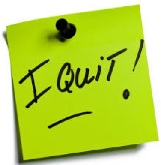Your career success might be determined more by how you QUIT a job than on how you GET a job. They say “quitters never prosper.” But I say that quitting, and quitting well, can sometimes be the best and most important career move of your life. Sadly, however, far too much attention is typically paid to how we go about getting the right job, and the methods and proper etiquette involved in quitting get ignored.
This article is my small contribution to change that trend and help you to quit well. I want you to be a better quitter.
As a pharmacist and pharma-career information junkie – I have noticed that sometimes we don’t handle the “quitting” side of our jobs very well. This may be understandable. Sometimes the timing of our quitting is not exactly conducive to the greatest amount of level-headed thinking. This is particularly true if the decision to quit was made rather hastily in reaction to a negative situation.
Nevertheless, I still submit that “quitting well” is extremely important for our overall career and personal success. In my 20+ years in this profession, I have seen some very bad examples, and I’ve seen a few good ones. Along the way I have picked up some experience in this area. I have personally “quit” 3 full-time jobs in my career. I’m happy to say that I took the good advice I was given, and the experiences were all very positive. Yours can be too.
I would like to pass along, therefore, my own advice to my friends and fellow healthcare professionals about how to quit your job.
8 TIPS FOR QUITTING YOUR JOB WELL
1 – DON’T QUIT AT ALL
My first piece of advice may sound backwards, but hear me out. Don’t quit. If it is possible, and if there is anything you can see that is fixable, try as hard as you can to make your present job the one you stick with. The learning curve when taking on a new job is usually pretty large. There will be new people, new processes and new pains. The grass isn’t always as green as it looks on the other side of the pharmacy counter.
What’s bugging you? Are you quitting just to avoid working out a problem with a co-worker? Are you quitting because of a dumb decision by a corporate executive? Have you let those in charge know, in writing, that this certain situation is making your job unbearable? My honest advice is that, all things being equal, it is easier to fix a bad situation than to jump into a new job altogether (which will likely have its own problems that need fixing eventually). Ask about the things that you would like to see changed. You never really know until you ask. You might not have to quit at all.
2 – DON’T QUIT YET!
My second piece of advice is similar to the first, but a bit different. Don’t quit yet. Wait a bit. Don’t make your decision to quit on a whim or in a moment of emotional frustration. Sleep on it. Big decisions like quitting a job are rarely done well if the occur in the heat of a moment. But in addition to that, I also recommend toughing it out if you are early in your new job. Did you just start there this month or this year? Recognize that quitting a job quickly (every 1-2 years) is going to look pretty bad on a resume to future employers. There is a time to call it quits. No one can tell you for sure when that is. Personally, I believe if you have been looking for a significant change in your workplace or have been actively seeking a promotion without success – you should be looking to get out at the 6-7 year mark. But that is only my advice – I’m not wearing your shoes.
3 – HAVE A PLAN/JOB OFFER IN HAND
In today’s economy and job market, quitting a job without a job offer in hand (or at least a plan for income) is risky business at best. If you haven’t looked for a pharmacy job recently, you may be in for a surprise. The market is not presently favorable to job-seekers. The jobs are out there – but you have to seek them and win them. It may take 6 months or more, sometimes over a year, to find a good fit. I personally recommend that you have ACCEPTED another job when you formally quit.
4 – PREPARE FOR A COUNTER OFFER
Depending on the type of job you have, and your relationship to your employer, you should be prepared for your current employer to try and keep you with some sort of counter offer. Employee turnover is expensive. Training someone new – even if there are tons of people lined up for your job – still involves costs and risks. If you are a good employee, they will make some effort to try and change your mind. Always say no. Let me say that again. Always say no. Do it graciously (more on that shortly), but thankfully decline any counter offer they make. Listen, if you have done what I recommended above (particularly steps 1 & 2) you are beyond the point of fixing this situation. Their counter offer is, at this point, only for THEIR sake – not for yours. And this move is about you. It is time to quit and move on.
5 – CONSIDER YOUR SUCCESSOR
It may depend on the type of job you are leaving, but I personally recommend that you have 1 or 2 people in mind you could recommend to fill your position for your employer. Make sure these are GOOD recommendations and ideally people who would seriously consider the offer. You know the job better than anyone else. You are in the BEST position to know who would do it well. I personally have successfully recommended my own replacements for jobs I have quit, and this effort was MUCH appreciated by my employer. And this leads to the next suggestion.
6 – BURN NO BRIDGES
Here is the most important thing I’m going to tell you. Don’t burn this bridge as you leave it. Just don’t. I don’t care how awful a company they were to work for, or how terrible your boss and co-workers were. Be a professional. Leave this job saying BETTER things about it than you might naturally be inclined to. This isn’t easy. This takes grace. But you simply never know when you might have an opportunity with this employer – or an executive with this employer – in the future.
This advice applies especially to what is often called your “exit interview.” With some companies you will be asked sit or chat with your boss or maybe someone from HR about your decision to leave. This is NOT the time to air your dirty laundry and list of complaints about your job. It just isn’t. That time has passed. Trust me – be 100% complimentary and gracious about your decision to leave. Explain how it was a hard decision, but that this new opportunity was a good fit for your future goals. Thank your employer for the opportunity and share the things you learned from them. Negativity might feel great for a moment – but it will have long-term consequences on your emotional well-being and job outlook.
7 – HOW TO ACTUALLY DO IT
Should you write a letter? An email? A phone call? I have read all sorts of advice about this – and frankly I think every situation is a bit unique. My personal advice is to write a thoughtful resignation letter. Keep it brief. Make is specific in terms of when your last day of work will be (keep in mind your employer has the right to ask you to immediately be done working if they so choose – and if so respect this). If your immediate supervisor is a frequent email checker – then I think email is okay. If not, use a phone call.
I believe it is professional and customary to give a 2 week notice. Some employment contracts stipulate you do so. But this should be something your future employer is aware of and they should know your plans to provide such notice.
Should you tell your co-workers first? Your boss? I believe your boss should be the first to hear your “official” resignation. But I also think your decision to look for other opportunities is one that you can safely talk about with your CLOSEST co-workers and friends. Sometimes they see things differently, and their perspective may make a big difference on your final decision.
You need to do it relatively quickly after getting a firm offer from another company. So I recommend just getting it over with. Some people find the thought of this process unbearable. If you need to, practice what you will say with a spouse or friend. But in the end, you just have to do it and get it over with. If you have followed my advice this far, you are probably on the right track, so don’t worry.
8 – FINISH WELL
The last couple weeks of your work will feel weird. You are there…but in some ways you are not there. You will sometimes feel like you are just going through the motions. But I strongly encourage you to finish well. Do everything in your power to make the transition and your absence easier for those you leave behind. Make them miss you! Go above and beyond the call of duty a bit more than usual these last 2 weeks or so.
For more career-related advice you may want to check out these articles:
Pharmacists – You Own Your Career.
Owning Your Career Part II – Networking for Pharmacists.
Owning Your Career Part III – Begin with the end.
©Jason Poquette and The Honest Apothecary. Unauthorized use and/or duplication of this material without express and written permission from this blog’s author and/or owner is strictly prohibited. Excerpts, quotes and links may be used, provided that full and clear credit is given to Jason Poquette and The Honest Apothecary with appropriate and specific links to the original content.
Careers How to Quit Quitting a job
Last modified: April 17, 2023
















